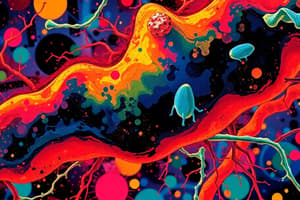Podcast
Questions and Answers
What is the primary function of the pituitary gland in the endocrine system?
What is the primary function of the pituitary gland in the endocrine system?
- To store hormones produced by the adrenal gland
- To produce hormones that directly respond to stimuli
- To produce hormones that stimulate the adrenal gland
- To regulate the production of hormones from other glands (correct)
Which type of memory is characterized by a very short duration, typically lasting only a few seconds?
Which type of memory is characterized by a very short duration, typically lasting only a few seconds?
- Long-term memory
- Short-term memory
- Sensory memory (correct)
- Episodic memory
What is the term for the process by which the body maintains a stable internal environment despite changes in the external environment?
What is the term for the process by which the body maintains a stable internal environment despite changes in the external environment?
- Homeostasis (correct)
- Metabolism
- Nervous response
- Endocrine regulation
Which type of neuron is responsible for transmitting information from sensory receptors to the central nervous system?
Which type of neuron is responsible for transmitting information from sensory receptors to the central nervous system?
What is the term for the gap between two neurons where chemical signals are transmitted?
What is the term for the gap between two neurons where chemical signals are transmitted?
Which of the following is NOT a type of receptor?
Which of the following is NOT a type of receptor?
What is the primary function of the adrenal gland in the endocrine system?
What is the primary function of the adrenal gland in the endocrine system?
What is the term for the process by which cells become specialized to perform specific functions?
What is the term for the process by which cells become specialized to perform specific functions?
Which of the following is an example of a covert behavior?
Which of the following is an example of a covert behavior?
Study Notes
Cellular Processes
- Diffusion is a form of transport in cells
- Enzymes catalyze metabolic reactions, including catabolic (breakdown) and anabolic (synthesis) reactions
Nervous System
- Divided into Central Nervous System (brain and spine) and Peripheral Nervous System (nerves)
- Nerve cells: sensory neurons (receive stimuli), connecting neurons (integration), and motor neurons (response)
- Synapses: gaps between neurons, neurotransmitters transmit signals
- Brain structures and functions: control center for body, processing and integrating information
- Receptors: detect stimuli (e.g., sensory receptors in skin)
- Effectors: respond to stimuli (e.g., muscles, glands)
Reflex Arcs and Endocrine System
- Reflex arcs: automatic responses to stimuli, involving sensory neurons, interneurons, and motor neurons
- Endocrine system: glands produce hormones, regulating body functions
- Pituitary gland: master gland, regulates other endocrine glands
- Adrenal glands: produce adrenaline, regulate stress response
- Ovaries and testes: produce sex hormones
Hormones and Homeostasis
- Hormones: chemical messengers, travel through bloodstream, detected by target cells
- Homeostasis: maintaining internal balance, using stimulus-response model and feedback
- Temperature control: thermoregulation, maintaining body temperature
Psychology
- Definition: scientific study of behavior and mental processes
- Overt behavior: observable, external actions
- Covert behavior: internal, mental processes
- Sports psychologists: enhance performance, overcome obstacles
- Forensic psychologists: apply psychology to law, justice, and policy
- 9 fields of psychology: clinical, counseling, school, industrial-organizational, social, developmental, cognitive, neuroscience, and personality
- Roles: research, assessment, intervention, consultation, education
Memory and Taste
- Memory process: encoding, storage, retrieval
- Sensory memory: brief, immediate, raw data
- Short-term memory: limited capacity, short duration
- Long-term memory: permanent storage, large capacity
- Ways to improve memory: repetition, organization, association, visualization
- Taste buds: located on tongue, detect 5 basic flavors (sweet, sour, salty, bitter, umami)
- Influences on taste perception: temperature, texture, smell, expectations
- Cones and rods: photoreceptors in retina, detecting light and color
Studying That Suits You
Use AI to generate personalized quizzes and flashcards to suit your learning preferences.
Description
Test your understanding of nervous system components, metabolism, and enzyme activity. This quiz covers nerve cells, synapses, receptors, and effectors, as well as catabolic and anabolic reactions.




